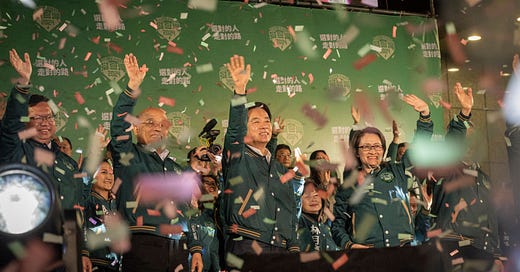
China Takes a Backseat
Outlining some of the implications of last month's election in Taiwan.
This column is free to everyone. To receive more in depth analysis of US foreign policy and international affairs, sign up for Foreign Exchanges’ email list today! And please consider subscribing to support the newsletter and help it continue to grow:
On January 13, 2024, over 13 million Taiwanese cast their votes in a three-way presidential race and legislative election. Lai Ching-te of the ruling Democratic Progressive Party (DPP) won the presidency with 40% of the vote. While some reporting has framed this as rebuke to China, Lai’s victory should be seen as a vote for continuity in Taiwanese politics. On the campaign trail, Lai has signaled he will uphold the status quo in Taiwanese-Chinese relations. However, Lai’s mandate is not as strong as his predecessor’s. Both the DPP and the main opposition party, the Kuomintang (KMT), performed below expectations. Third-party candidate Ko Wen-je made substantial inroads from disaffected voters unhappy with stagnant economic conditions. It appears that the traditional political axes of Taiwanese identity and relations with Beijing are beginning to fade in importance. What does this mean for Taiwanese politics?

A Three-Way Race
Lai will usher in a third consecutive presidential term for the DPP. Typically, after two terms party fatigue sets in and voters give an opportunity to the opposition. Since Taiwan transitioned from single-party authoritarian rule to democracy in the late 1980s and 1990s, no party has held the presidential office for more than two terms consecutively.
Lai may have been aided by a divided opposition. For the past three decades, Taiwan has been dominated by two major political parties—the DPP and the KMT. This election saw the emergence of a credible third party candidate, Ko Wen-je of the relatively new Taiwan People’s Party (TPP). Ko, a former surgeon turned politician, came to prominence in 2014 as the independent mayor of Taipei, a political office that has historically been a stepping stone to the presidency. In 2019 he established the TPP, hoping to challenge the two heavyweight parties. During this presidential run, Ko had made overtures to the KMT candidate Hou Yu-ih regarding the possibility of a joint Ko-Hou ticket to oppose the DPP. The TPP-KMT alliance was nearly cemented, then fell apart in public (and somewhat embarrassing) fashion over the question of who would sit atop the ticket. Despite his public setbacks, Ko managed to secure 26% of the vote.
Ko Wen-je winning over a quarter of the vote as a third party candidate is impressive. In fact, at one brief point several months ago, Ko was the most popular candidate in polling. For a candidate prone to gaffes and misogynous statements, it was arguably a better than expected result. What explains Ko’s success? In a nutshell, Ko has remarkable support from the voters under 40, vastly outpolling his two opponents. Younger voters find Ko to be more authentic, pragmatic, and in general, fresher than his opponents. For many Taiwanese, politics have ossified around the two traditional parties. Meanwhile, young Taiwanese face rising costs of living, meager wage growth, and a daunting real estate market. The perception that neither the KMT nor the DPP are interested in bread-and-butter issues has cost them support among younger demographics.
The Traditional Parties
Both Lai and outgoing President Tsai Ing-wen hail from the DPP, which traces its roots to Taiwan’s transition from authoritarian rule under the Kuomintang to democracy during the 1980s. Early DPP founders were democracy activists who sought to end martial law, many of them having served prison sentences for allegedly subverting the state. After Taiwan democratized in the 1990s and opposition parties were legally allowed, the DPP formed as the main opposition to the Kuomintang.
The DPP platform rests on two pillars: supporting a Taiwanese identity and advocating for Taiwan’s sovereignty. Over the years, people in Taiwan who identify as only Taiwanese have grown to become the majority. The DPP has encouraged a pluralistic, civic nationalism built on Taiwan’s diversity. This is meant to include Indigenous Taiwanese present on the island for millennia, Taiwanese who trace their ancestry to the Ming and Qing dynasties, Chinese mainlanders who arrived in 1949, and recent “new immigrants” from Southeast Asia. It should be noted that this pluralistic idealism does not always translate to an equitable and just social and political system.
In foreign policy and relations with Beijing, the DPP seeks to protect and expand Taiwan’s sovereignty. The DPP is often painted as “pro-independence,” but there are valences to the meaning of independence that have shifted over time. Over thirty years ago before the DPP became a mainstream party, it called for de jure, or formal, independence, meaning declaring something like a “Republic of Taiwan” instead of Taiwan’s inherited official designation as the “Republic of China.” But in 1999, the DPP officially moved away from that stance. Tsai Ing-wen has faithfully followed that 1999 revision, regularly stating that Taiwan was “already independent,” meaning it was de facto independent—possessing its own military, administering its own laws, conducting its own foreign policy—and thus implying that de jure independence is unnecessary. Policymakers in Taiwan understand that declaring de jure independence crosses a line drawn by the People’s Republic of China (PRC) and would almost certainly risk war. The post-1999 position of “already independent” is language that continues the status quo. Lai has taken the same position.
Lai will also likely continue Tsai’s policy of strengthening Taiwan’s relationships with friendly nations. Under Tsai, Taiwan regularly hosted parliamentary and congressional representatives from the European Union, the United States, and other Western nations. Tsai also sought to expand Taiwan’s international profile, for example through Taiwan’s “We Can Help” campaign during the height of the COVID pandemic. None of this has sat well with Beijing. Even though the DPP has largely hewed to the status quo, Beijing has labeled the party as troublemakers advocating for separatism. It has gone at lengths to isolate the DPP and support its main opposition party, the KMT.
Over the past 30 years, the KMT has served as the other main party dominating Taiwan’s political landscape. The KMT founded the Republic of China (ROC) in 1912 on mainland China, and from 1947 to 1987 ruled Taiwan under martial law as an authoritarian party-state. Even though the KMT has transformed into a democratic political party and KMT politicians have disavowed parts of its past, many Taiwanese see the KMT as complicit with its brutal past human rights abuses and terror campaigns. For its base, the KMT represents a party of traditional Chinese values, pragmatic foreign policy, and economic vitality. Under KMT rule from the 50s to 90s, Taiwan experienced an economic miracle, which older KMT supporters remember well. Former KMT Presidential candidate Han Kuo-yu campaigned on a platform of populism and nostalgia for the economic heyday during the 1980s, when middle and upper class incomes rose dramatically. KMT policies since then have tended to favor business and encourage lucrative trade and investment into China.
The China Factor
The KMT still primarily differentiates itself from the DPP through one of the major fault lines in Taiwanese politics: China. The PRC, which claims Taiwan as its own territory, favors dealing with the KMT over the more pro-Taiwan DPP. The KMT in turn showcases its access to top officials in Beijing. It argues that its friendly relationship with Beijing means it can bargain with the PRC to Taiwan’s advantage, and that this path is a more pragmatic means to guarantee peace.
How to conduct relations with China, in essence a 2000 pound gorilla that happens to live right next door, has been a central defining question in Taiwanese politics. But Taiwan experts point to something else they argue is even more important—identity, meaning whether Taiwanese are “Chinese.” Even though polls consistently show less than 3% of people on Taiwan identify as only Chinese, the KMT continues to champion its historical roots as the party of the “Republic of China” and as a protector of Chinese culture and heritage. There is room for nuance on this question, since even though most may not identify as Chinese, people on Taiwan might still identify with Chinese culture and the heritage of the Republic of China.
In past elections, both identity and Beijing policy took center stage. Han Kuo-yu, the KMT presidential candidate in 2020, emphasized identity. He relied on populist tactics, such as claiming to fight for the common people and leaning into a nationalism that riled up the base. Han rose to prominence as mayor of Kaohsiung, a former DPP stronghold and industrial center that has fallen on hard times as Taiwanese enterprises offshore production to China and Southeast Asia. Han evoked nostalgia for the economic heyday of Kaohsiung and Taiwan during the 1980s when the KMT ruled as an authoritarian party-state, encouraging Taiwanese to forget the party’s human rights abuses and instead recall rising incomes and economic optimism. Though Han’s populism resulted in the emergence of “Han fanatics” who rallied behind him with a passion unseen by the KMT in recent years, it also turned off many moderate voters. More consequentially, however, Han’s campaign coincided with Beijing’s crackdown on mass protests in Hong Kong. Han’s pro-China policies turned into a liability, as the phrase “Hong Kong today, Taiwan tomorrow” echoed in the political discourse, helping Tsai Ing-wen to a landslide victory with 58% of the 2020 vote.
The 2024 candidate chosen by the KMT, Hou Yu-ih, did not follow Han down the road of nostalgia and populism. As a career policeman and most recently mayor of New Taipei City, Hou was meant to be a moderate candidate who would appeal to the center and steal votes from the DPP. But he did nonetheless hew to longstanding KMT principles upholding “Chineseness,” including the so-called “1992 Consensus,” an informal agreement between the KMT and Beijing that allows both to build relations around a version of the “One China” principle.
Over time, Hou leaned further into a conservative, pro-China direction. He attempted to tap into fear over changes to Taiwan’s conservative death penalty policy as a wedge issue. He chose a deeply conservative and pro-China political talk show commentator as his vice-presidential pick. Then, he proposed revitalizing the Cross-Strait Services and Trade Agreement (CSSTA) with Beijing, a trade deal proposed in 2013 under the last KMT President, Ma Ying-jeou. The unpopularity of closer ties with Beijing and anti-democratic maneuvers the KMT utilized to force the agreement through the Legislative Yuan sparked the Sunflower Movement, the largest protest in Taiwan’s history. It is puzzling why Hou would propose reviving a deeply unpopular idea. The KMT has long claimed that closer economic ties with China benefit Taiwan. While it is true that Taiwanese businesses have benefitted from taking advantage of cheap labor in China, the perspective from younger and working class Taiwanese is that those gains are largely seen by corporations and the wealthy—not by wage earners at the bottom.
The KMT can take solace in at least one small victory: a plurality in Taiwan’s parliamentary body, the Legislative Yuan. Legislative results often reflect the infrastructural dimension of campaigning in particular districts, where the KMT holds an advantage from decades of relationship-building in some communities. The DPP lost 10 seats, reducing them to 51 out of 113 seats in total. The KMT secured 52 total seats, giving it a plurality. Whereas under Tsai’s two terms the DPP controlled both the presidency and a majority in the legislature, Lai now faces a divided government, and the KMT will have some leverage because of that.
Still, this is the third consecutive presidential defeat for the KMT. Its last two candidates, Hou and Han Kuo-yu, only achieved 33% and 38% of the vote respectively. For a party that has never gone more than 8 years out of the presidency, this is troubling. In the past week, the new legislators voted none other than failed KMT candidate Han Kuo-yu as the speaker of the Legislative Yuan. By nominating Han, the KMT seems to be signaling a return to the energizing but divisive politics that he had embraced during his presidential run. Yet seeing as how this formula of catering to nationalism and nostalgia has already failed once, it is questionable whether a second run will see any greater success.
A New Challenger?
The Taiwan People’s Party was founded in 2019, when then-Taipei Mayor Ko Wen-je formed a new political party around his popularity. Third parties outside of the DPP and KMT have had an important role in Taiwan’s political history, though none have won majorities in the Legislative Yuan or been successful in winning the presidency. The TPP seeks to change that. A decade ago, Ko left a highly prestigious position as a trauma surgeon at National Taiwan University to enter politics, following the 2014 Sunflower Movement and aligned with its progressive, pro-Taiwan, and anti-China politics. As Taipei mayor he successfully won a second term and earned a fair deal of name recognition. Today, Ko is the face of the TPP.
Over time Ko has moved to the center, and arguably center-right. His position on relations with Beijing mirrors the KMT’s, particularly in his reference to Taiwan and China as "one family"—a term that is used and preferred by the Chinese government because it implies that both are part of the same ethnic and cultural group. Like Hou Yu-ih, Ko has also proposed restarting talks with Beijing to revive the 2013 Cross-Strait Services Trade Agreement. Although he named his political machine the Taiwan People’s Party, Ko’s “one family” position suggests that the party is not really “pro-Taiwan,” at least not in the way that the DPP is. This has led to speculation that Ko’s flexibility on this issue merely reflects political opportunism. Nonetheless, Ko seems to have built a following, centering on voters under 40 who strongly disfavor the two main parties and, perhaps, look past his shortcomings and see a vote for the TPP as primarily a protest vote.
Even though Ko did not win, the TPP did win 8 seats in the Legislative Yuan. Since no party holds a majority, these 8 seats allow the TPP to pursue a coalition with either the DPP or the KMT. In such a “kingmaker” role, the TPP could wield significant power as the two main parties will try to court its votes to pass laws. However, in the first order of business for the new Legislative Yuan session, the TPP chose to eschew alliances altogether. Instead of leveraging its position to support either a DPP or KMT speaker in exchange for concessions, the TPP chose to nominate its own candidate, who had no chance of victory. The KMT thus secured the speakership for Han Kuo-yu on a party-line vote. If the TPP opts to align itself with one of the two larger parties it risks undermining its strongest asset, its third party “outsider” independence. That calculus likely informed the party’s approach to the speaker vote. Still, other “third force” parties in Taiwan’s recent past have struggled to expand their political foothold, and TPP will likely face a similar challenge.
The 2024 Elections and Taiwan’s Future
For the KMT, its legislative success indicates that its party machine still functions—arguably quite well, at least at the local level in some corners of the country. Still, its failure at the presidential level will force party leaders to face difficult questions. Hou’s moderate position still only attracted about a third of the vote. The KMT has younger faces, such as current Taipei Mayor Chiang Wan-an, who claims descent from Chiang Kai-shek, the dictator who ruled Taiwan for three decades. Chiang Wan-an’s politics have shifted away from the traditional KMT pro-China platform. For example, Chiang has stated that the KMT is flexible in proposing a new discourse to replace the aforementioned “1992 Consensus.” At its core, the 1992 Consensus centers on an idea of “Chineseness” that most Taiwanese no longer find compelling. Past KMT party chairs have publicly considered abandoning the 1992 Consensus, and then walked that position back in the face of pushback from more conservative KMT elements. This inability to revise an increasingly unpopular position is a problem the KMT will see exacerbated as younger generations move farther and farther away from a Chinese identity.
Some have questioned whether the TPP might even usurp the KMT as the primary opposition party to the DPP. Its legislative performance was better than expected and places the TPP on a path to make another run for the presidency in four years. Can the TPP utilize its kingmaker position in the Legislative Yuan to further institutionalize the party and build a solid base of voters? From the TPP’s perspective, it would love to supplant the KMT. However, hardline KMT voters seem to dislike Ko and still cling to the KMT’s platform of ROC nationalism. Winning 8 legislative seats is one thing. Winning the presidency appears to be well beyond the TPP’s reach at the moment.
The DPP will coalesce around Lai Ching-te as the new face of the party after 8 years of leadership behind Tsai Ing-wen. Expect to see Lai continue the formula that Tsai devised, maintaining the status quo with Beijing while expanding Taiwan’s informal relations with Western nations. Looking forward, it is worth paying attention to Hsiao Bi-khim, the Vice President-elect and most recently, Taiwanese ambassador to the US. Hsiao comes from an international background and in some ways is reminiscent of a younger Tsai, with her eloquence and vociferous defense of Tawain's sovereignty against Chinese aggression.
Ultimately, the China factor appeared to be muted in this election cycle, even while military tensions are arguably at an all-time high. Misinformation and coercion from Beijing have not pushed voters toward China’s preferred party, the KMT. Even Hou Yu-ih alluded to the importance of maintaining Taiwan’s democracy against the PRC on the campaign trail. On the other hand, Chinese threats failed to deliver a landslide win for Lai like they did for Tsai in 2020. The rise of a credible third party candidate in Ko signals that discontent over domestic issues still plays a role in Taiwanese elections. Lai will need to address this in his first term in order to secure reelection. The wildcard remains China. Will Beijing continue to work with the KMT, their historic rivals turned partners? Or do Chinese leaders, like the DPP and KMT, need to reconsider their approach to Taiwanese voters?















Very pleased to be hearing from James Lin again. China coverage without the headlines written in scary red font.